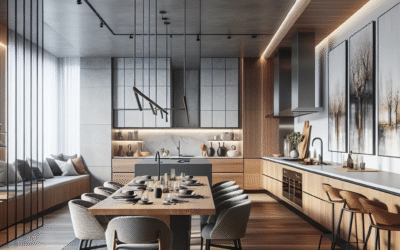
Ever walked into a room and instantly felt at ease or energized? The secret often lies in the lighting. Lighting can significantly influence our mental and emotional well-being. In this article, we’ll unravel the various lighting solutions that can enhance your wellness vibes and transform your space into a sanctuary. You’ll discover how different types of lighting affect mood, tips for choosing the right fixtures, and actionable insights to create an environment that promotes wellness.
By the end of this guide, you’ll feel empowered to make decisions about your space’s lighting that not only beautify your home but also enhance your overall sense of well-being. We’ll cover:
- The impact of natural light and circadian rhythms
- Different types of artificial lighting
- Practical steps to improve your current lighting solutions
- Innovative lighting technologies for wellness
- Integration of plants and lighting for holistic vibes
The Impact of Natural Light on Wellness
Natural light is a powerful catalyst for improving mood and performance. Its influence on our circadian rhythms can drastically enhance our physical and mental health.
Understanding Circadian Rhythms
Circadian rhythms are internal processes that regulate the sleep-wake cycle and repeat roughly every 24 hours. Exposure to natural light during the day helps maintain these rhythms, improving sleep quality and mood. Studies show that individuals exposed to adequate natural light report lower levels of stress and anxiety.
Maximizing Natural Light in Your Space
- Window Placement: Before moving, consider how your future space gets sunlight.
- Mirrors: Place mirrors strategically to reflect and amplify sunlight.
- Light Colors: Use lighter colors on walls to aid in reflecting natural light.
Types of Artificial Lighting and Their Effects
While natural light is vital, artificial lighting plays a significant role, especially in seasons with less sunlight.
Warm vs. Cool Lighting
Choosing between warm and cool lighting can shape the ambience dramatically. Warm lights (2700K-3000K) create a cozy atmosphere, while cool lights (4000K-5000K) often feel more energetic and invigorating.
Layering Light Sources
A successful lighting design incorporates multiple sources to create depth and versatility:
- Ambient Lighting: Main light source for overall illumination.
- Task Lighting: Specific areas requiring focused light, like reading corners.
- Accent Lighting: Highlights artwork or architectural features.
Practical Steps to Enhance Your Current Lighting Solutions
To maximize the benefits of your current lighting situation, consider these actionable insights:
Evaluate Your Space
Take a critical look at your current lighting setup. Does it match the mood you want to create? Are there areas that are too harsh or too dim? Adjusting this can greatly affect your response to your environment.
Invest in Dimmers
Dimmers allow you to adjust brightness according to the time of day or activity, making them an invaluable tool for maintaining wellness vibes. This flexibility can significantly enhance your emotional and physical atmosphere.
Utilize Smart Lighting Technology
Smart technology such as apps and timers allows you to control your lighting remotely, even mimicking natural light patterns, which can be particularly beneficial for those working from home.
Innovative Lighting Technologies for Wellness
Recent technological advances are paving the way for wellness-focused lighting solutions.
Human-Centric Lighting
Human-centric lighting aligns closely with our biological needs, as it adjusts the light’s intensity and spectrum throughout the day. This type of lighting can result in improved mood and productivity.
LED vs. Traditional Bulbs
| Criteria | LED Bulbs | Traditional Bulbs |
|---|---|---|
| Longevity | Up to 25,000 hours | 1,000 hours |
| Energy Efficiency | Up to 80% more efficient | Less efficient |
| Quality of Light | Customizable hues and warmth | Limited options |
Integrating Plants and Lighting for Holistic Vibes
Combining plants and lighting can create a soothing environment that is beneficial for your well-being.
Choosing the Right Plants for Your Space
Consider low-light plants like snake plants or peace lilies, which thrive in various lighting conditions and contribute to better air quality.
Lighting for Plant Growth
If natural light is limited, consider grow lights. These LED lights have specific wavelengths that promote photosynthesis, enhancing not only plant health but your emotional health as well.
FAQs
How can I improve my mood with lighting?
Improving mood can often be achieved by ensuring adequate natural light during the day, using warm lighting in the evenings, and incorporating adjustable lighting features.
What is the ideal color temperature for home lighting?
The ideal color temperature varies by room: 2700K-3000K is perfect for living spaces for a warm vibe, while 4000K-5000K is excellent for workspaces requiring focus.
Can smart lighting really enhance wellness?
Yes, smart lighting can simulate natural light patterns and adjust brightness according to your needs, promoting a healthy circadian rhythm and enhancing overall wellness.
Conclusion & Next Steps
Lighting solutions hold the key to enhancing wellness vibes in your space. By focusing on natural light, choosing the right fixtures, and incorporating technology, you can create an environment that supports your mental and emotional well-being. Remember, it’s not just about illumination; it’s about creating a sanctuary that reflects your needs and lifestyle.
If you found this article helpful, explore our other content on home wellness and design tips to further transform your space.
Content Disclaimer
The information provided in this article is for educational purposes only and should not be considered professional advice. For specific concerns regarding health or wellness, consult qualified professionals.
Categories
- Accent Walls & Ceilings (84)
- Art Curation & Gallery (83)
- Bedding Style Trends (89)
- Bedroom Makeover (96)
- Bohemian & Eclectic Styles (80)
- DIY & Budget-Friendly Decor (78)
- Eco-Friendly Design (83)
- Furniture Care (87)
- Home Decor & Design Ideas (181)
- Home Wellness Spaces (103)
- Integrated Outdoor Living (91)
- Japandi Style (84)
- Kids and Nursery Decor (73)
- Living Room Decor (99)
- Mix & Match Techniques (95)
- Modern & Contemporary Design (88)
- Rug Sizing & Placement (89)
- Scandinavian Design Inspiration (51)
- Seasonal Home Decor (100)
- Small Space Solutions (93)
- Wall Art & Painting Tips (94)
Recent Comments
Archives
Product Gallery
-
Majestic African Wildlife Canvas Art for Stylish Home Decor
Rated 5.00 out of 5 -
Cozy Irregular Green Plush Rug for Nordic Living Spaces
Rated 5.00 out of 5$41.00 – $256.00Price range: $41.00 through $256.00 -
Scandinavian Geometric Area Rugs for Stylish Home Décor
Rated 5.00 out of 5$30.00 – $441.00Price range: $30.00 through $441.00













